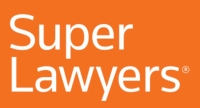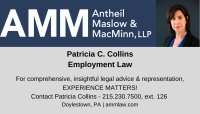Antheil Maslow & MacMinn, LLP is proud to announce that eight of our attorneys have been selected for inclusion again this year in the 2023 Thomson Reuters Super Lawyers and Rising Stars listing. Each year, no more than 5 percent of the lawyers in the state are selected by Super Lawyers to receive this honor. Super Lawyers, a Thomson Reuters business, is a rating service of outstanding lawyers from more than 70 practice areas who have attained a high degree of peer recognition and professional achievement.
Five Partners of the firm were selected to the 2023 Super Lawyers List: Jessica A. Pritchard, Family Law, who was also selected for the Top 50: 2023 Women Pennsylvania Super Lawyers List; Elizabeth Fineman, Family Law; Michael W. Mills, Business/Corporate, Estates & Trusts & Tax Law; Joanne M. Murray, Business/ Corporate Law; and Peter J. Smith, Business/Corporate, Real Estate, Estates & Trusts and Nonprofit Law.
Three AMM attorneys were selected to the 2023 Pennsylvania Rising Stars list: Lisa Bothwell, Business/Corporate Law; Megan Weiler, Family Law and Partner Elaine Yandrisevits, Estate Planning and Administration, with a focus on special needs trust planning.
Antheil Maslow & MacMinn, LLP is a full-service law firm located in Doylestown, PA.
At AMM, we pride ourselves on developing deep relationships with our clients by taking time to understand their goals in order to provide responsive, practical legal advice and aggressive advocacy.
Susan A. Maslow, founding partner of the law firm of Antheil Maslow & MacMinn, LLP (AMM Law) and Senior Advisor to the Responsible Contracting Project joined Patrick Miller and Olivia Windham Stewart in a recent podcast entitled “Supply Chain Contracts Are Protecting Human Rights”.
The podcast explains how Model Contract Clauses can Protect Human Rights in Supply Chains and can be a valuable tool in helping businesses fulfill obligations under growing legislation requiring that they tackle the challenge of identifying, addressing and preventing human rights abuses in operations. This podcast is of interest to business owners with concerns regarding Withhold Release Orders from U.S. Customs and Border Protection, how to act on the EU Corporate Sustainability Reporting Directive (CSRD) and proposed EU Corporate Sustainability Due Diligence Directive (CSDDD) or looking to embed the UNGPs and OECD Guidelines into their contracts.
Susan Maslow can be reached at smaslow@ammlaw.com or 215.230.7500 ext. 119.
Antheil Maslow & MacMinn, LLP is a full-service law firm located in Doylestown, PA. At AMM, we pride ourselves on developing deep relationships with our clients by taking time to understand their goals in order to provide responsive, practical legal advice and aggressive advocacy.
Susan A. Maslow, founding partner of the law firm of Antheil Maslow & MacMinn, LLP (AMM Law) and chair of the Corporate Social Responsibility Law Committee of the ABA Business Law Section will participate in an online panel discussion hosted by the American Bar Association International Law Section: “Rule of Law Webathon on Thursday May 18th from 11:00 a.m. -12:30 p.m. EDT. The program is part of the ABA’s Rule of Law Webathon, to register, visit www.americanbar.org/intlaw.
The Universal Declaration of Human Rights is celebrated as the first legal document protecting universal human rights, the Declaration underpins international human rights law, international humanitarian law, international criminal law, international refugee law, and many other areas of international law. Human rights law standards based on the Declaration have now entered the private sphere. Soft law requirements, such as the UN Guiding Principles on Business and Human Rights and the OECD Guidelines for Multinational Enterprises, are being transformed into hard law regulatory and legislative obligations for businesses. Alongside ESG (environmental, social, and governance) and sustainability, these developments are fostering profound changes in the risks to and responsibilities of businesses. The panel of experts will explain this evolving area and explore the implications for lawyers.
Susan Maslow can be reached at smaslow@ammlaw.com or 215.230.7500 ext. 119.
Antheil Maslow & MacMinn, LLP is a full-service law firm located in Doylestown, PA. At AMM, we pride ourselves on developing deep relationships with our clients by taking time to understand their goals in order to provide responsive, practical legal advice and aggressive advocacy.
Patricia Collins, Esquire will join a panel discussion at the Bucks County Bar Association’s 5th Annual Business Law Institute on May 9, 2023. This continuing legal education program entitled “Negotiating C-Suite Employment, Severance, and Transition Agreements” will be held at the BCBA Offices in Doylestown. Collins is a partner in the Doylestown law firm of Antheil Maslow & MacMinn, LLP [AMM Law], practicing Employment Law and Commercial Litigation.
Collins joins Michael Romeo, a transactional attorney on a panel discussion focused on the key trends and considerations related to negotiating employment agreements, severance agreements, and transition agreements for C-suite employees. The program will be moderated by Travis Nelson, Esquire, and will examine ways that both executives and companies can reach agreeable terms for compensation packages, including severance provisions, tax indemnification provisions, and early termination protection. The program offers CLE credit. To register, visit the Bucks County Bar Association registration page.
To learn more about employment law services at AMM Law or Patricia Collins, visit out Employment Law practice page. Patricia Collins can be reached at pcollins@ammlaw.com or 215.230.7500 ext. 126
The ESG Backlash: Politics and Shareholder Primacy
Written by Susan MaslowReprinted from the April 2023 edition of Business Law Today. Further duplication without permission is prohibited.
By Susan A. Maslow
In the late 2010s and early 2020s, ESG—a wide-capturing acronym standing for “environmental, social and governance”—roared into action, emerging both domestically and abroad as one of the defining trends in investing, regulation, finance, and corporate governance.
ESG’s proponents have long sought a unified framework through which to describe interrelated standards of environmental sustainability and human rights, and bring them into greater alignment with the private sector’s traditional profit-seeking goals. This change in approach arguably gained in prominence after the Business Roundtable’s 2019 declaration on the purpose of the corporation, endorsing a vision of corporations being led for the benefit of all stakeholders, not just shareholders. Though many question the sincerity and commitment of the Roundtable, the ESG movement was super-charged, and it achieved mainstream status during the 2020 protests for racial justice, which spurred companies to integrate new goals for diversity, equity, inclusion, and racial justice into their broader ESG policies. Over the course of the last eighteen months, public company boards have been sued for breaches of fiduciary duty based on alleged failures to react to ESG factor “red flags.”
Pennsylvania Human Relations Commission Adopts Specific Definitions of Protected Classes
Written by Patricia CollinsReprinted from the April 20th edition of The Legal Intelligencer. (c) 2023 ALM Media Properties. Further duplication without permission is prohibited.
On March 23, 2022, the Pennsylvania Human Relations Commission (“PHRC”) proposed new regulations to expand the definition of certain protected classes. The Amendments will create new Pennsylvania Code Sections at 16 Pa. Code §§ 41.201 – 41.207, and would expand the terms “sex”; “religious creed” and “race” for purposes of the Pennsylvania Humans Relations Act (“PHRA”) and the Pennsylvania Fair Educational Opportunities Act (“PFEOA”). The regulations were approved on December 8, 2022. The regulations are not yet in effect, but will become effective 60 days after publication in the Pennsylvania Bulletin.
The PHRA prohibits discrimination in employment because of race, color, religious creed, ancestry, age, sex, national origin or non-job related handicap or disability. 43 Pa. Stat. § 955(a). The regulations relating to the PHRA previously provided definitions only for the terms “pregnancy” and “disability due to pregnancy or childbirth”. 16 Pa. Code 41.101. The definition of the other protected classes was left to the PHRC’s guidance and cases interpreting the statute.
The amendments to Title 16 of the Pennsylvania Code would add a new subchapter, entitled “Protected Classes”, for the purpose of ensuring that all unlawful discriminatory practices proscribed by the PHRA and PFEOA are “interpreted and applied consistently”, and that all complaints filed with the PHRC “are investigated consistent with the rules outlined herein.” The regulations calls for liberal construction to accomplish the purpose of the PHRA and PFEOA.
The Federal Trade Commission’s Proposed Ban On Non-Competes
Written by Patricia CollinsReprinted from the February 10th edition of The Legal Intelligencer. (c) 2022 ALM Media Properties. Further duplication without permission is prohibited.
On January 5, 2023, the Federal Trade Commission (“FTC”) proposed rules imposing a broad restriction on non-competition agreements (“Proposed Rule”). The Proposed Rule would require employers to rescind existing non-compete agreements, and would preempt conflicting state laws. The ban marks a dramatic change not only in the law, but in the relationship between employers and their key employees.
The Proposed Rule defines “non-compete clauses” as follows: any agreement that prevents a worker from seeking or attempting to seek employment with any employer; or, any agreement that is a de facto non-compete clause. A de facto noncompete clause has the “effect of prohibiting the worker from seeking or accepting employment.” The Proposed Rule provides examples of a de facto non-compete clause: a non-disclosure agreement drafted so broadly that it effectively precludes the employee from working in their chosen field; or a contractual term that requires the employee to pay the employer or a third party its training costs if employment terminates within a specified time period, but only where the payment is not reasonably related to the actual costs incurred by the employer.
The Proposed Rule mandates that it is a prohibited unfair method of competition to enter into or “attempt to enter into” a noncompete clause with an employee, or to maintain an existing non-compete agreement, or to represent to an employee that they are subject to a noncompete without a good faith basis to believe they are.
Two partners of Antheil Maslow and MacMinn, LLP were honored with awards at the Bucks County Bar Association’s annual meeting on December 1, 2022.
Joanne M. Murray, a partner and chair of the Firm’s corporate and real estate practice group, received the prestigious 2022 Harriet M. Mims Award. The award is named after Harriet Mims, who was the first female judge in Bucks County and one of the first women admitted to the Bucks County Bar. The award is presented annually to a female attorney who exhibits the characteristics of strength, leadership and integrity who also has served as a mentor to young lawyers. In addition to her career as a preeminent business and corporate attorney, Ms. Murray is an active member of the local charitable community, serving as President of the Board of National Alliance on Mental Illness, Bucks County. She also serves on the Board of the Doylestown Health Foundation and was recently elected to the Boards of the Bucks County Bar Association and the Central Bucks Chamber of Commerce. Ms. Murray is a Past President of the Bucks County Bar Association and previously served on the Board of the Village Improvement Association of Doylestown, the Bucks County Children’s Museum, and various other local nonprofit boards. She was named a 2022 SuperLawyer by Thomson Reuters.
Elaine T. Yandrisevits, a partner in the firm’s Estates and Trusts practice group, received the President’s Award from outgoing BCBA President Julie D. Goldstein, recognizing dedicated service to the Bar Association, its committees and commitment to the development of the Bucks County legal community. Elaine Yandrisevits focuses her practice on estate planning, trusts and estate administration and Orphans' Court litigation, and has a great deal of practical experience with special needs trust planning and guardianships. Ms. Yandrisevits is active in several committees and sections of the Bucks County Bar Association. She will serve as Chair of the Young Lawyers Division and Chaur of the Orphans’ Court Section in 2023, and previously served as the 2022 Bench Bar Conference Committee Chair. She is also active in the Member Services Committee of the Bar Association. Ms. Yandrisevits was named a 2022 SuperLawyer Rising Star by Thomson Reuters.
The Trafficking Victims Protection Act and Liquidated Damages Provisions in Employment Agreements
Written by Patricia CollinsReprinted with permission from the October 14th edition of The Legal Intelligencer. (c) 2022 ALM Media Properties. Further duplication without permission is prohibited.
Employers eager to recapture the costs of hiring foreign citizens often use damages or repayment provisions in employment agreements. A recent case in the Southern District of New York illustrates a challenge to that strategy. The Southern District’s recent decision in Baldia v. RN Express Staffing Registry LLC to allow a complaint under the federal Trafficking Victims Protection Act (“TVPA”) to proceed, is part of a growing trend in using the TVPA to challenge such agreements.
The plaintiff in the Baldia case, Marie Alexandrine Baldia, is a citizen of the Philippines. RN Express Staffing recruited her from the Philippines and hired her as a registered nurse supervisor after sponsoring her visa to work in the United States. Baldia signed an Employment Agreement for a three-year term, that included a liquidated damages provision. Specifically, the Employment Agreement required that in the event Baldia left the employ of RN Express Staffing, “without cause”, before the end of the three-year term, she would need to repay the costs of “recruiting, training and placement”. The Employment Agreement recited that the “Company Recruitment Costs” totaled $33,320, and that the number would be reduced after her first full year of employment.
AMM family law attorney Melanie J. Wender will join the faculty for a virtual continuing legal education program for National Business Institute on Thursday, November 3rd.
The program, Legal Obstacles to Adoption, gives an overview of the top pitfalls one may come across during the adoption process. The faculty will focus on providing insight on how to deal with prominent hurdles such as termination of parental rights, interstate adoptions, and contested adoptions.
Melanie Wender is a dedicated and supportive advocate for individuals and families facing the sensitive issues involved in family law matters. Ms. Wender focuses her practice exclusively in all aspects of divorce and family law. She is also experienced in adoption issues and has assisted many clients in making this life-changing process as seamless and smooth as possible, allowing the family to focus on welcoming their new child.







